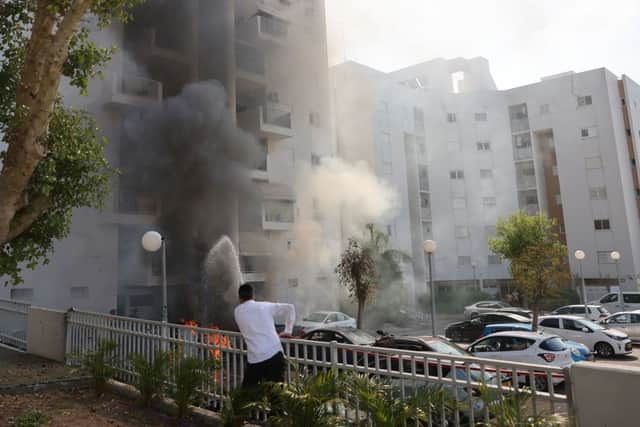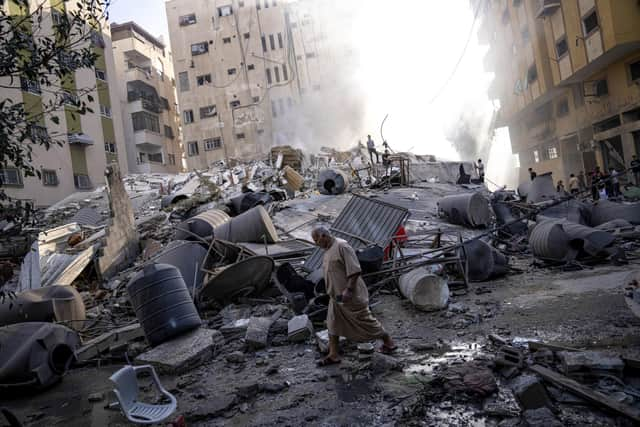Why is there a war in Israel? Why Hamas attacked from Gaza - and conflict with Palestine explained
and live on Freeview channel 276
The Israel-Palestine conflict has been violently reignited after Palestinian militant group Hamas launched a multi-front attack on Israel from Gaza.
Hamas fired thousands of rockets at Israel, while armed fighters entered the country - killing civilians and taking others hostage. In response, Israeli Prime Minister Benjamin Netanyahu declared they were “at war” and launched air strikes at Gaza.
Advertisement
Hide AdAdvertisement
Hide AdThe Palestinian health ministry said that 313 Palestinians have been killed by the retaliation, while Israeli are reporting that at least 600 Israelis have been killed following the attack by Hamas. Sadly, both of these numbers are only expected to rise further.
Although the currently unfolding situation is the most serious escalation of the Israel-Palestine conflict in years, the roots of the dispute span back to World War One. Meanwhile, some of the sources of tension can be traced back to biblical times, which goes some way to explain why the conflict is so complicated.
So, why is there a war in Israel? What is Hamas? What is Gaza? We’ll explain everything you need to know about the history of the conflict between Israel and Palestine - and take a look at what could happen next.


Why is there conflict between Israel and Palestine?
To understand the history of the conflict, we first need to understand Palestine. Before 1948, Palestine was a geographical region located in the Eastern Mediterranean, bordered by modern-day Israel, Jordan, and Lebanon.
Advertisement
Hide AdAdvertisement
Hide AdIt was home to a diverse population of Arabs, Jews, and Christians - as all groups had strong religious ties to the area, especially the biblical city of Jerusalem. The land itself was ruled by various empires over the years, such as the Persians, Greeks, Romans, etc - before eventually coming under control of the Ottoman Empire.
The Ottoman Empire ruled Palestine for forty years until it was defeated in World War One. Subsequently, the League of Nations gave control of Palestine to Britain, under something called the British Mandate.
The land at that time was inhabited by a Jewish minority and an Arab majority, but tensions between the two groups began to grow when the international community gave Britain the task of establishing “a national home” for Jewish people in Palestine. Both the Jews and the Palestinian Arabs believed the land was their ancestral home.
Tensions further escalated during the 1920s and 1940s, when the number of Jews arriving in Palestine increased as they fled persecution in Europe during World War Two, and sought a homeland after the Holocaust. Many Palestinians were displaced as a result of the increased immigration, which only deepened the dispute.


Advertisement
Hide AdAdvertisement
Hide AdIn 1947, the United Nations (UN) voted for Palestine to be split into separate Jewish and Arab states, and for Jerusalem to become an international city. The Jewish community widely accepted the plan but the Palestinian community argued the UN had no right to split up their land, meaning the plan was never implemented.
In 1948, British leaders ceased trying to solve the conflict, and Jewish leaders declared the creation of the State of Israel. This marked the end of the British rule in Palestine.
Many Palestinians objected to the creation of Israel and a war ensued. By the time the fighting ended, Israel controlled most of the territory - and hundreds of thousands of Palestinians had been driven from their homes in what they call Al Nakba, or “The Catastrophe”.
There was never any peace agreement which means that more tension, disputes, and wars have continued over the following decades. To this day, many Jews refuse to acknowledge the existence of Palestine, while many Palestinians refuse to acknowledge Israel and still refer to it as Palestine.
Advertisement
Hide AdAdvertisement
Hide AdNowadays, the area formerly known as Palestine is divided into three parts: the State of Israel, the West Bank (of the Jordan River), and the Gaza Strip.
What is Gaza?
The Gaza Strip is central to the current ‘war’ as it is from where Hamas entered Israel early on Saturday (7 October) and has long been a contested territory.
It is a 41km-long and 10km-wide territory between Israel, Egypt, and the Mediterranean Sea. The air space over Gaza is controlled by Israel, which also restricts who and what goods are allowed in and out through its borders. However, Gaza is under the jurisdiction of the Palestinian Authority and the Strip itself is governed by Hamas.
The Gaza Strip is home to around 2 million Palestinians, many of whom were displaced and driven there in 1948. Other refugees from Palestine live in Jordan, Lebanon, and Syria, but Israel has never allowed them to return to their homes - claiming it would overwhelm the country and threaten its existence as a state.
What is Hamas?
Advertisement
Hide AdAdvertisement
Hide AdHamas is a Palestinian Islamist militant group which, as mentioned above, has the Gaza Strip since 2007. It is sworn to the destruction of Israel.
Hamas is backed by Iran, which provides it with funding, weapons, and training. The United States, the European Union, and the UK have all designated the military movement as a terrorist organisation.
Why has Hamas attacked Israel?
Hamas and Israel have engaged in several wars over the years, with Hamas repeatedly firing deadly rockets at Israel - and Israel also consistently attacking Hamas with air strikes. Together, with Egypt, Israel has also blockaded the Gaza Strip since 2007, which it says is necessary for security.
One of the most recent events in the conflict happened in 2021, when Israeli Police raided Al-Aqsa Mosque in Jerusalem - launching an 11-day war between Israel and Hamas. More than 200 Palestinians and more than 10 Israelis were killed.
Advertisement
Hide AdAdvertisement
Hide AdViolence between the two sides has been increasing since then, so another conflict was sure to come, but the scale of the attack by Hamas shocked the world - and for many, still came as something of a surprise as in recent months there have been greater moves towards diplomacy.
The timing of the attack has been pointed to, as it came just a day after Israel marked the 50th anniversary of the Yom Kippur war in 1973, which brought it to the verge of catastrophic defeat in a surprise attack by Syria and Egypt. But the scale of Hamas’ actions suggest this was not a spur of the moment decision and had instead been planned for a while.
According to Hamas, it has attacked Israel in order to declare “enough is enough”. It has said it is a response to Palestinian suffering at the hands of Israel over the years, and has urged Palestinians everywhere to fight.
What followed is what many are calling an “unprecedented” attack on Israel - with Hamas fighters entering communities in Israel near the Gaza Strip. Civilians have been kidnapped, attacked, taken hostage, and killed - with many horrific videos of these events emerging on social media.
Advertisement
Hide AdAdvertisement
Hide AdIsrael has launched deadly air strikes in response - and brutal clashes between forces are continuing.
What happens next?
Israeli Prime Minister Benjamin Netanyahu has declared war. In a statement on Saturday (7 October), he told citizens that this is “not an escalation”, “not an operation”, “but a war”. He promised that the “the enemy will pay a price he has never known” - and vowed to win the war, even if it took a long time.
Hamas has also given no indication that it will back down, which means the conflict could continue for a while. How long exactly is unclear, but what is clear, is that as long as it does more death and destruction will sadly continue.
Comment Guidelines
National World encourages reader discussion on our stories. User feedback, insights and back-and-forth exchanges add a rich layer of context to reporting. Please review our Community Guidelines before commenting.
